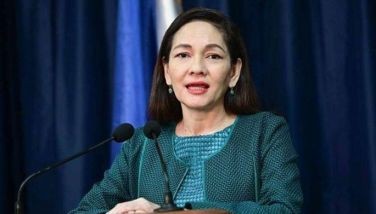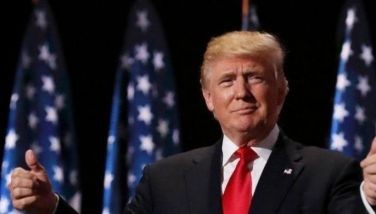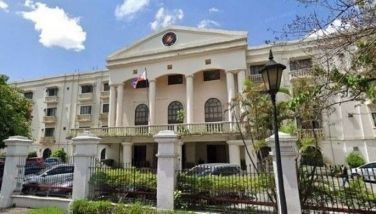Double Barrel 2: More arrests, less deaths
MANILA, Philippines - In the week since the implementation of a “reloaded” campaign against illegal drugs, police stayed true to their word that it would be less bloody, with more people arrested than killed.
A total 331 drug suspects were arrested in nationwide operations since the Philippine National Police (PNP) launched its “Project Double Barrel: Reloaded” last Monday.
Thirteen drug suspects were killed, with all of them allegedly putting up a fight against arresting lawmen.
On the other hand, only 14 self-confessed drug pushers and 13 users surrendered under Oplan Tokhang Part 2.
This was significantly lower than the previous Tokhang campaign where many of those who surrendered ended up dead at the hands of suspected vigilante groups supporting the brutal anti-drug campaign.
Officials stressed the renewed campaign against illegal drugs is not as violent and brutal as the first Oplan Tokhang.
Director Camilo Pancratius Cascolan, director of the PNP Directorate for Operations, said he expects more arrests in the coming days.
“For as long they don’t turn violent,” Cascolan said.
Tokhang, taken from the Visayan words toktok (knock) and hangyo (plead), is the centerpiece of the PNP’s campaign against illegal drugs. It involves going house-to-house to encourage suspected drug offenders to surrender or voluntarily undergo rehabilitation.
Tokhang was suspended early this year following the involvement of several police officials in the kidnapping and murder of South Korean businessman Jee Ick-joo in an extortion attempt that took advantage of the anti-drug campaign.
The controversial campaign also resulted in the killing of thousands of people by police and suspected vigilante groups.
The PNP said a total of 2,555 drug suspects were killed and 53,025 others were arrested in 43,593 police operations from July last year to January.
There were 2,928 others killed by suspected vigilante groups, which the PNP classified as “deaths under investigation” (DUI).
Most of those killed during police operations were cases of “nanlaban,” police jargon indicating the drug suspects supposedly resisted arrest and shot it out with policemen.
Around 1.8 million surrendered during the same period.
After Tokhang was suspended, authorities noted the resurgence of the drug trade, which the PNP said has justified its reimposition of Tokhang.
PNP chief Director General Ronald dela Rosa has promised that there will be less bloodshed in the renewed Tokhang.
“This time we will make sure it will be less bloody if not bloodless,” he said.
Dela Rosa said the newly formed PNP Drug Enforcement Group (DEG) would be composed of officers with no tainted background.
He added only police commanders, station commanders or precinct commanders or territorial units are authorized to conduct operations under the new Tokhang.
They are now required to coordinate their operations with barangay officials, he said.
The Dangerous Drugs Board (DDB) has provided guidelines for barangay officials in creating the Barangay Anti-Drug Abuse Council (BADAC).
The guidelines said BADAC should render assistance to law enforcement agencies in anti-illegal drug operations in their areas.
Malacañang expressed its support for the DEG under an executive order (EO) creating a superbody called Interagency Committee on Anti-Illegal Drugs (ICAD).
Under the EO, the ICAD will be led and chaired by the Philippine Drug Enforcement Agency (PDEA).
The PDEA is also allowed to tap the military in the conduct of its operations.
President Duterte issued EO No. 15, creating four clusters under the inter-agency committee.
“The justice cluster shall be primarily responsible for the expeditious prosecution of all drug cases, the provision of legal assistance to law enforcers and ensuring the availability of public attorneys for the protection of individuals’ rights, such as in instances of voluntary surrenders and warrantless arrests during anti-illegal drug operations,” the order read.
The enforcement cluster is tasked to conduct anti-illegal drug operations with the support of other law enforcement agencies through PDEA and the National Anti-Drug Task Force. It will also be responsible for the conduct of investigations against drug syndicates, financiers and other target personalities.
“The PDEA and the Task Force may seek the assistance of the Armed Forces of the Philippines, the Philippine Center for Transnational Crime and all other agencies, subject to applicable laws, rules and regulations, in the conduct of anti-illegal drug operations,” it added.
When called by the ICAD chair for assistance, the concerned agency will provide the required personnel and other resources in the anti-illegal drug operations.
The ICAD chair is tasked to activate the National Anti-Illegal Drug Task Force.
The DBB, on the other hand, was included as a member of all the clusters in the ICAD.
The DBB has also decided to adopt the penalty imposed by the Civil Service Commission on government officials and employees caught using drugs, which is dismissal on first offense. – Christina Mendez, Sheila Crisostomo, Gilbert Bayoran
- Latest
- Trending































